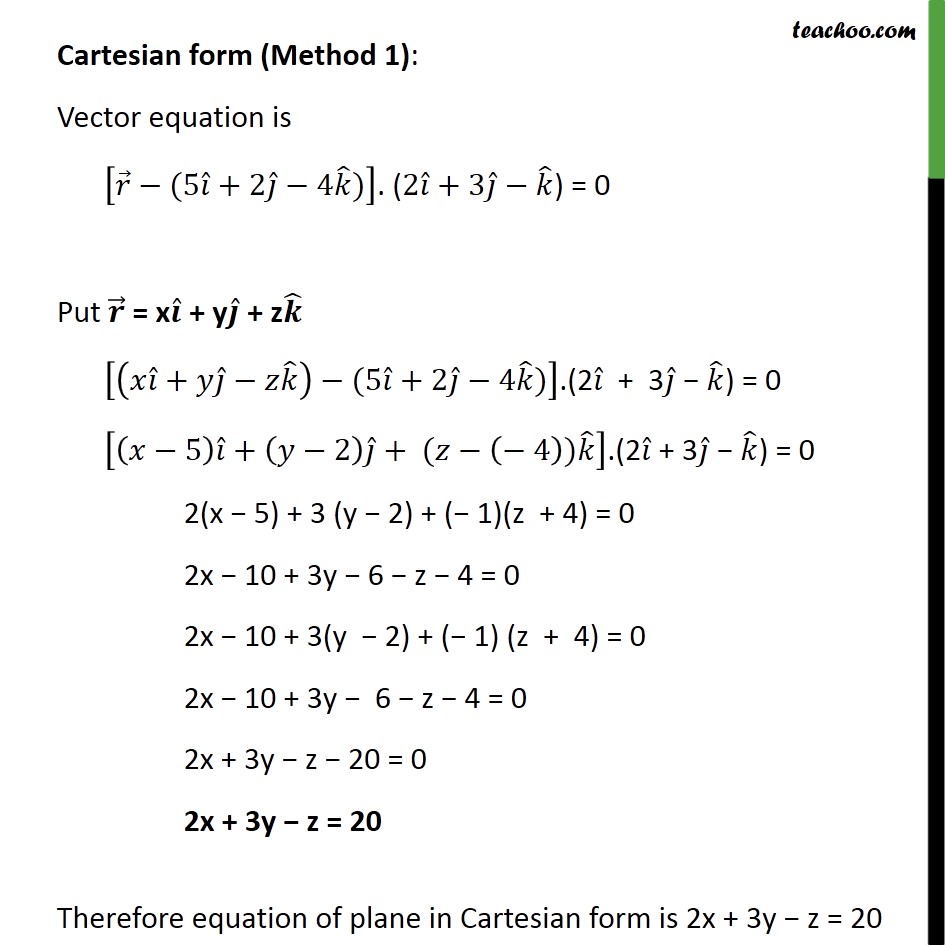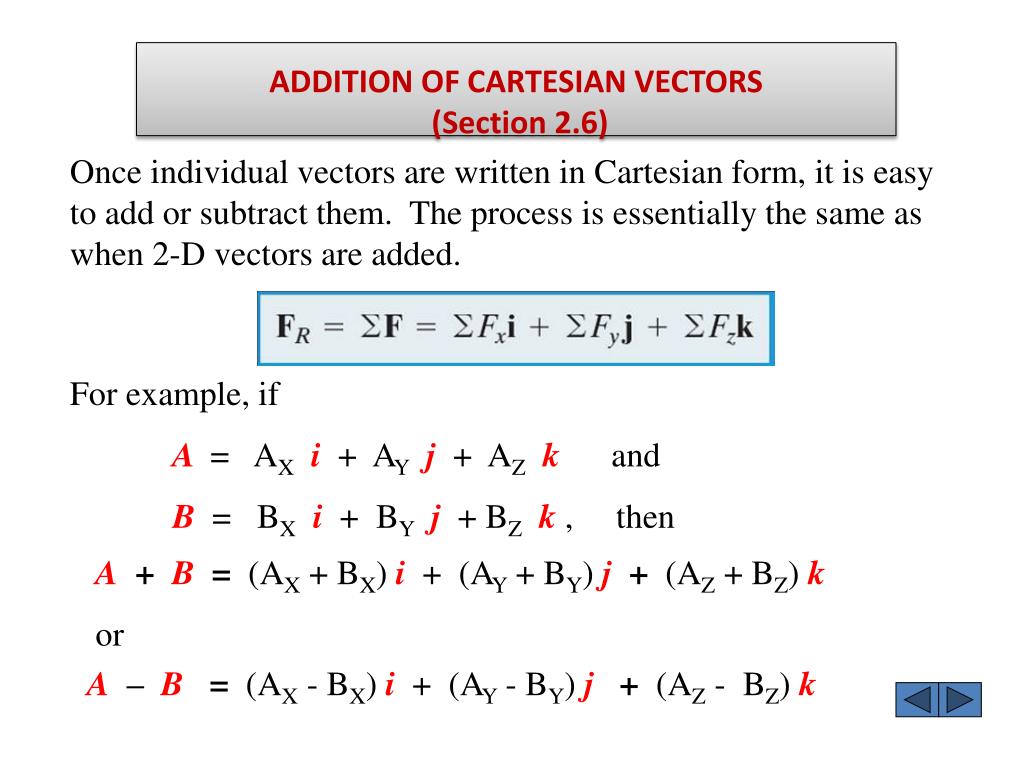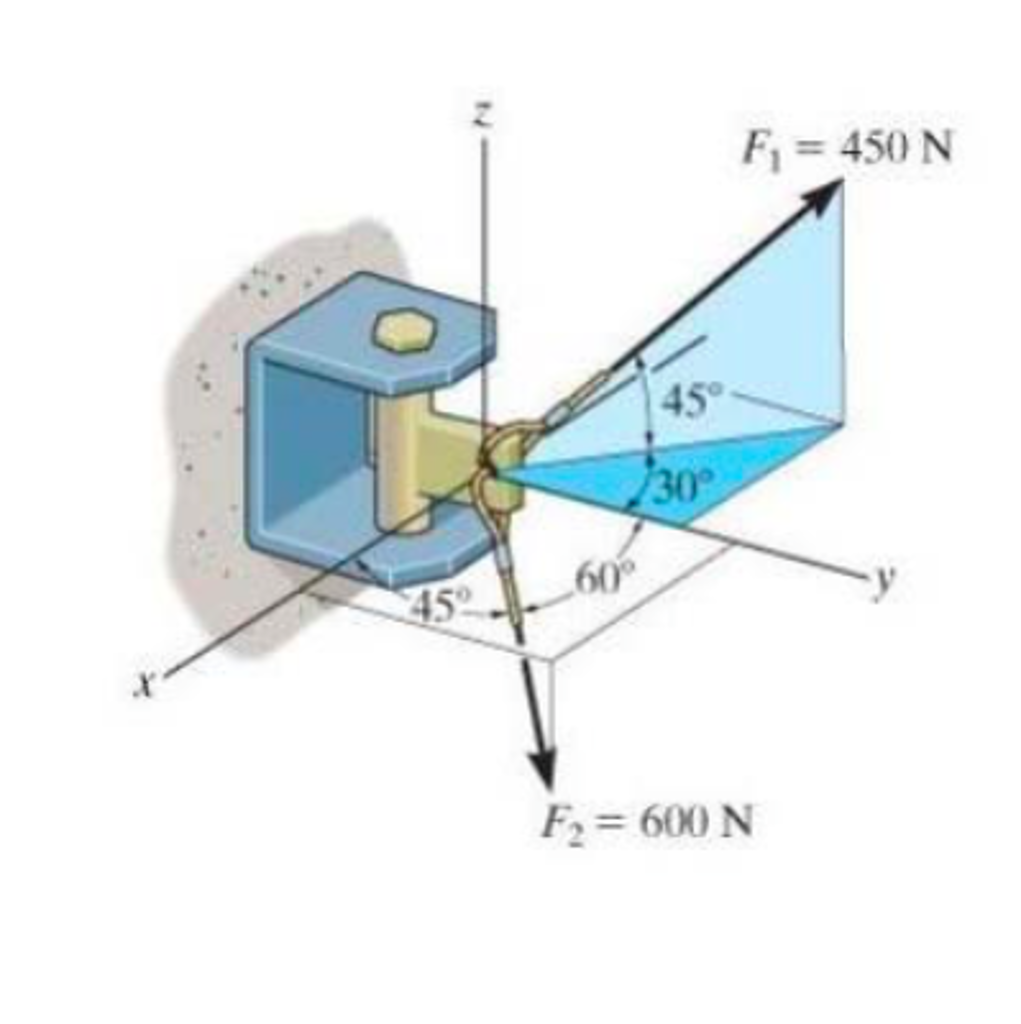Cartesian Form Vector
Cartesian Form Vector - Here is what i have tried: Solution both vectors are in cartesian form and their lengths can be calculated using the formula we have and therefore two given vectors have the same length. Find u→ in cartesian form if u→ is a vector in the first quadrant, ∣u→∣=8 and the direction of u→ is 75° in standard position. This can be done using two simple techniques. Where λ ∈ r, and is a scalar/parameter The vector form can be easily converted into cartesian form by 2 simple methods. The components of a vector along orthogonal axes are called rectangular components or cartesian components. It’s important to know how we can express these forces in cartesian vector form as it helps us solve three dimensional problems. A function (or relation) written using ( x, y ) or ( x, y, z ) coordinates. By working with just the geometric definition of the magnitude and direction of vectors, we were able to define operations such as addition, subtraction, and multiplication by scalars.
A b → = 1 i − 2 j − 2 k a c → = 1 i + 1 j. Get full lessons & more subjects at: Adding vectors in magnitude & direction form. Finding three points on the plane by setting two variables equal to 0: Show that the vectors and have the same magnitude. For example, 7 x + y + 4 z = 31 that passes through the point ( 1, 4, 5) is ( 1, 4, 5) + s ( 4, 0, − 7) + t ( 0, 4, − 1) , s, t in r. In cartesian form, a vector a is represented as a = a x i + a y j + a z k. It’s important to know how we can express these forces in cartesian vector form as it helps us solve three dimensional problems. In linear algebra, a rotation matrix is a transformation matrix that is used to perform a rotation in euclidean space. Web this is just a few minutes of a complete course.
Web this is just a few minutes of a complete course. By working with just the geometric definition of the magnitude and direction of vectors, we were able to define operations such as addition, subtraction, and multiplication by scalars. In linear algebra, a rotation matrix is a transformation matrix that is used to perform a rotation in euclidean space. I prefer the ( 1, − 2, − 2), ( 1, 1, 0) notation to the i, j, k notation. In this way, following the parallelogram rule for vector addition, each vector on a cartesian plane can be expressed as the vector sum of its vector components: Web converting vector form into cartesian form and vice versa. The vector equation of a line is \vec {r} = 3\hat {i} + 2\hat {j} + \hat {k} + \lambda ( \hat {i} + 9\hat {j} + 7\hat {k}) r = 3i^+ 2j ^+ k^ + λ(i^+9j ^ + 7k^), where \lambda λ is a parameter. Write the direction vector, b = a + b + c write the vector form of the equation as r = a + λ b. Find u→ in cartesian form if u→ is a vector in the first quadrant, ∣u→∣=8 and the direction of u→ is 75° in standard position. The plane containing a, b, c.
Express F in Cartesian Vector form YouTube
Web viewed 16k times. The following video goes through each example to show you how you can express each force in cartesian vector form. In this unit we describe these unit vectors in two dimensions and in threedimensions, and show how they can be used in calculations. In this way, following the parallelogram rule for vector addition, each vector on.
Example 17 Find vector cartesian equations of plane passing Exampl
Then write the position vector of the point through which the line is passing. The components of a vector along orthogonal axes are called rectangular components or cartesian components. (i) using the arbitrary form of vector First, the arbitrary form of vector [math processing error] r → is written as [math processing error] r → = x i ^ +.
PPT FORCE VECTORS, VECTOR OPERATIONS & ADDITION OF FORCES 2D & 3D
Cartesian coordinates, polar coordinates, parametric equations. Web there are usually three ways a force is shown. How do you convert equations of planes from cartesian to vector form? Web solution conversion of cartesian to vector : Solution both vectors are in cartesian form and their lengths can be calculated using the formula we have and therefore two given vectors have.
Solved 1. Write both the force vectors in Cartesian form.
For example, 7 x + y + 4 z = 31 that passes through the point ( 1, 4, 5) is ( 1, 4, 5) + s ( 4, 0, − 7) + t ( 0, 4, − 1) , s, t in r. In this way, following the parallelogram rule for vector addition, each vector on a cartesian plane.
Resultant Vector In Cartesian Form RESTULS
Round each of the coordinates to one decimal place. Web converting vector form into cartesian form and vice versa. A b → = 1 i − 2 j − 2 k a c → = 1 i + 1 j. Web i need to convert a plane's equation from cartesian form to parametric form. Web the cartesian form can be.
Express each in Cartesian Vector form and find the resultant force
The vector equation of a line is \vec {r} = 3\hat {i} + 2\hat {j} + \hat {k} + \lambda ( \hat {i} + 9\hat {j} + 7\hat {k}) r = 3i^+ 2j ^+ k^ + λ(i^+9j ^ + 7k^), where \lambda λ is a parameter. Web explain the meaning of the unit vectors i,jandk express two dimensional and three.
Find the Cartesian Vector form of the three forces on the sign and the
Web there are usually three ways a force is shown. First, the arbitrary form of vector [math processing error] r → is written as [math processing error] r → = x i ^ + y j ^ + z k ^. Web the cartesian form can be easily transformed into vector form, and the same vector form can be transformed.
Example 8 The Cartesian equation of a line is. Find vector
Adding vectors in magnitude & direction form. First find two vectors in the plane: Web there are usually three ways a force is shown. Web write given the cartesian equation in standard form. This can be done using two simple techniques.
Bab2
By working with just the geometric definition of the magnitude and direction of vectors, we were able to define operations such as addition, subtraction, and multiplication by scalars. The plane containing a, b, c. First, the arbitrary form of vector [math processing error] r → is written as [math processing error] r → = x i ^ + y j.
Ex 11.2, 5 Find equation of line in vector, cartesian form
A vector decomposed (resolved) into its rectangular components can be expressed by using two possible notations namely the scalar notation (scalar components) and the cartesian vector notation. A b → = 1 i − 2 j − 2 k a c → = 1 i + 1 j. Web solution conversion of cartesian to vector : How do you convert.
Web The Cartesian Form Of A Plane Can Be Represented As Ax + By + Cz = D Where A, B, And C Are Direction Cosines That Are Normal To The Plane And D Is The Distance From The Origin To The Plane.
Web cartesian form of vector. Web any vector may be expressed in cartesian components, by using unit vectors in the directions ofthe coordinate axes. This can be done using two simple techniques. How do you convert equations of planes from cartesian to vector form?
Web This Is Just A Few Minutes Of A Complete Course.
Round each of the coordinates to one decimal place. A function (or relation) written using ( x, y ) or ( x, y, z ) coordinates. Magnitude & direction form of vectors. The following video goes through each example to show you how you can express each force in cartesian vector form.
Terms And Formulas From Algebra I To Calculus.
The components of a vector along orthogonal axes are called rectangular components or cartesian components. In this way, following the parallelogram rule for vector addition, each vector on a cartesian plane can be expressed as the vector sum of its vector components: Web the cartesian form can be easily transformed into vector form, and the same vector form can be transformed back to cartesian form. A vector decomposed (resolved) into its rectangular components can be expressed by using two possible notations namely the scalar notation (scalar components) and the cartesian vector notation.
Web Viewed 16K Times.
In cartesian form, a vector a is represented as a = a x i + a y j + a z k. Finding three points on the plane by setting two variables equal to 0: For example, using the convention below, the matrix. Find u→ in cartesian form if u→ is a vector in the first quadrant, ∣u→∣=8 and the direction of u→ is 75° in standard position.









